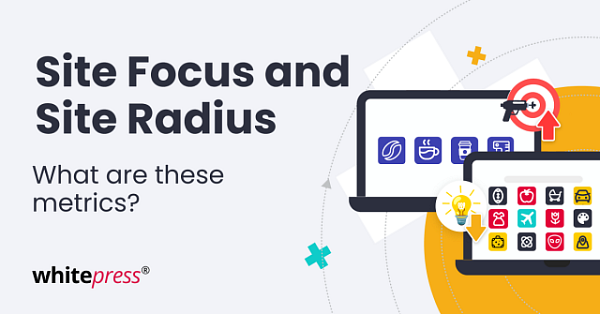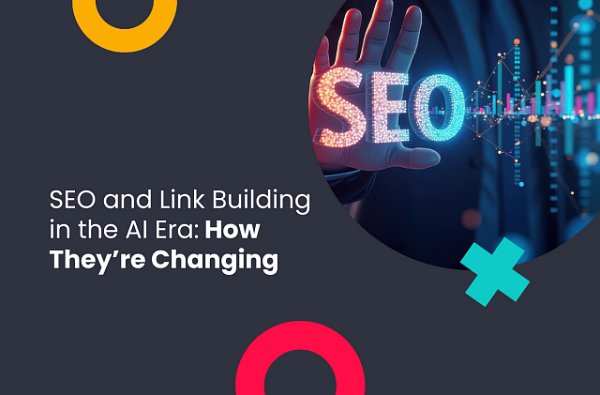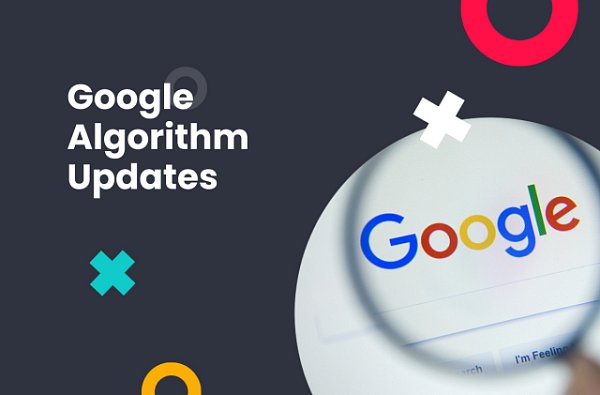(13 min. read)
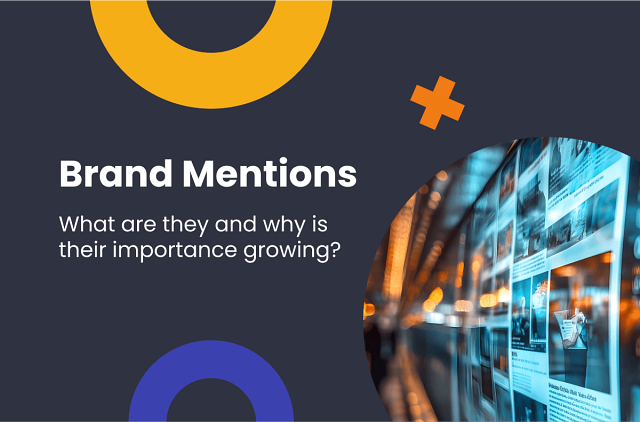
What are brand mentions?
Brand mentions are any publicly available references to your brand online. They can take the form of your company name, a product, or a service appearing in an article, a social media post, a forum comment, or even a customer review. In simple terms, it’s any situation where someone talks about your brand on the internet, sending a clear signal that your business is present and part of the conversation.
Most mentions don’t include a clickable link to your website – unless we’re talking about linked mentions (a service you can also find in the WhitePress® platform under the link insertion option). In most cases, the brand is simply referenced by name within the content.
Mentions can take different forms:
- Direct and indirect mentions – Direct mentions use the exact brand name (for example, Nike). Indirect mentions refer to the brand through its products, slogans, or recognisable elements (for instance, Just Do It, which is associated with Nike).
- Positive, neutral, and negative mentions – The tone matters. A glowing review or a recommendation strengthens your reputation, a neutral mention (for example, in a company ranking) boosts brand awareness, while negative comments can signal potential reputation issues. Each tone impacts how the brand is perceived by the audience and by algorithms.
In short, a brand mention acts as a marker that your company exists in the online sphere. Even if it doesn’t immediately drive a click to your website, it still influences how your business is perceived and can encourage users to search for your brand on Google, visit your site, or make a purchase later on.
Brand mentions vs. link building
So, how do mentions differ from backlinks? Backlinks allow users to click through directly to your website and, at the same time, transfer link equity (often referred to as “link juice”), which remains a crucial ranking factor. Google reaffirmed the importance of backlinks for search visibility during the Search Central Live APAC 2025 conference.
Mentions, on the other hand, don’t include an active hyperlink – they are purely a reference to your brand name in the content. That doesn’t mean they’re irrelevant to Google. Frequent mentions show search algorithms that your brand carries authority within its field and is being talked about across the web. Unlike unbranded link-building publications, brand mentions can also have a positive effect on awareness and reputation.
In other words, link building and mention building are two sides of the same coin. Both strategies aim to prove to Google and LLM-based assistants that your website is valuable and trustworthy. The ideal scenario is when your brand is not only frequently cited, but also properly linked – giving search engines the full spectrum of signals that confirm your site’s strong position.
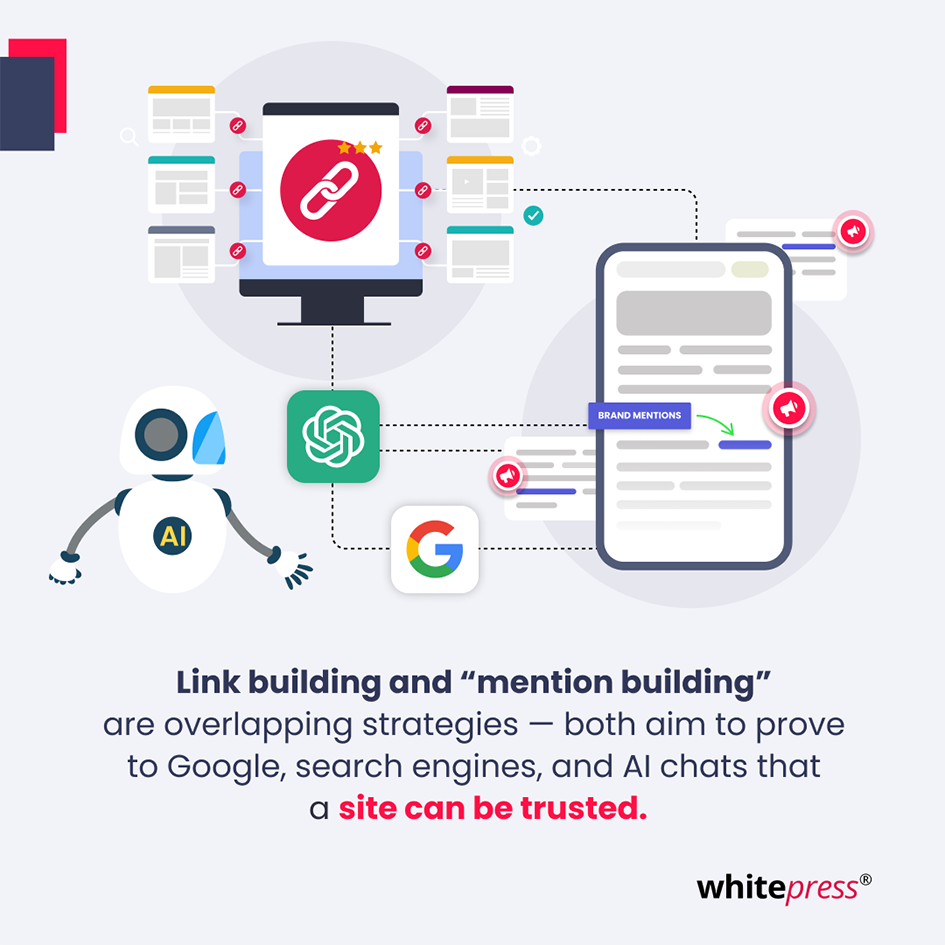
The Growing Importance of Brand Mentions
It’s worth remembering that brand mentions are not a new concept. Back in 2016, Duane Forrester from Bing highlighted that the search engine already considered brand mentions without links as signals of authority. A year later, during his talk at BrightonSEO, Gary Illyes from Google pointed out that high-quality content often cited online – not only through backlinks, but also via social media mentions or brand-related discussions – is a clear indication that a company is “doing the right things” (Search Engine Land).
In recent years, however, their role has grown significantly, especially in the context of AI. Search algorithms are becoming increasingly refined. Today, Google and LLMs look not only at how many links point to your website, but also at who is talking about your brand and in what context. In other words, the so-called brand signals are becoming more influential than ever
Several recent findings underline their growing importance:
- Ahrefs analysed 75,000 brands and discovered that those with the highest number of mentions appeared in AI-generated summaries and answers up to 10 times more often than less frequently mentioned brands.
- Over 70% of consumers say they trust brand mentions more than traditional advertising (Search Engine Land).
- Around 60% of search ranking factors are now linked to off-page signals. This means that the more often a brand appears in social media, articles, or reviews, the greater its chances of achieving high visibility in Google (Rise at Seven).
- The June 2025 Google Core Update introduced explicit brand citations in AI Overviews. This shift shows that simply being mentioned can now represent a “top position” in search – even without a clickable link (GetStuffDigital).
Why do brand mentions matter for SEO?
SEO today is more holistic than ever. It’s no longer about individual signals such as backlinks, but about the broader picture of a brand’s online reputation. Here’s how mentions contribute directly to your SEO efforts:
Building authority and trust (E-E-A-T)
Mentions on respected sources act as endorsements. When an industry portal, a popular blog, or a recognised expert talks about your business, Google takes it as a sign that your brand is credible. Such references strengthen E-E-A-T signals (Experience, Expertise, Authoritativeness, Trustworthiness). Search engines reward sites they perceive as authoritative, and being frequently mentioned in a positive light helps to reinforce that trust.
Boosting search visibility
Every mention is an additional touchpoint between your brand and search engines. When your name regularly appears on industry-relevant sites, Google associates it more strongly with those topics. This translates into better rankings for related keywords. For example, if a skincare brand called XYZ is often mentioned in the context of “skin care”, the algorithm will recognise XYZ as a key player in this niche and is more likely to show its website to users searching for beauty tips.
Strengthening semantic connections
Mentions help position your brand within specific thematic areas. Algorithms don’t just register that your brand name has appeared – they also examine the surrounding content. This allows Google to better understand the topics, keywords, and issues your brand is associated with. As a result, your site can gain in relevance and show up for queries closely connected to your industry.
Comment

Toma Grozăvescu, Founder of Smarters
I feel that brand mentions are for the industry what user interaction with SERPs and web pages was a few years ago. We felt it mattered, but it was hard to prove. Today, however, no one questions it.
For some time now, we’ve been collecting fragments that show the growing importance of brand mentions, even without links. Sometimes it was small details in certain studies, other times the opinion of an expert, or a project where things didn’t work as expected (e.g., a ‘big brand’ website tends to rank faster than a business without notoriety).
I think if we look at updates from traditional search engines (e.g., the proportion of forum results, Instagram content indexing, etc.) and at how AI assistants work, it’s clear that your own site has long ceased to be the sole source of truth. These systems look far beyond the domain itself to assess how “trustworthy” or “authoritative” a brand or person is.
Internally, we’ve even started talking about Entity SEO to include this aspect of mentions, beyond the ‘classic’ dofollow backlinks.
To paraphrase Jay-Z: we’re no longer a website, man; we’re a brand.
Influencing user behaviour and purchase decisions
Not all the value of mentions comes from algorithms – user behaviour matters just as much. When someone comes across a reference to your brand and finds it intriguing, they often look you up on Google or visit your site directly. What matters here is that this is high-quality traffic: someone has read about your brand, become interested, and chosen to visit you on their own initiative. Such visits – whether through branded Google searches or direct entries to your website – act as a strong signal to search engines that your brand engages its audience.
Moreover, mentions act as social proof: if potential customers see your brand praised in various places – reviews, articles, or social media – their trust increases, along with the likelihood of choosing your products or services. Positive buzz also boosts click-through rates (CTR) in search results, and a higher CTR can, in turn, have a positive impact on your rankings. In addition, engaged users tend to spend more time on your site, are more likely to convert, and often return – and all these behaviours serve as further quality signals for Google.
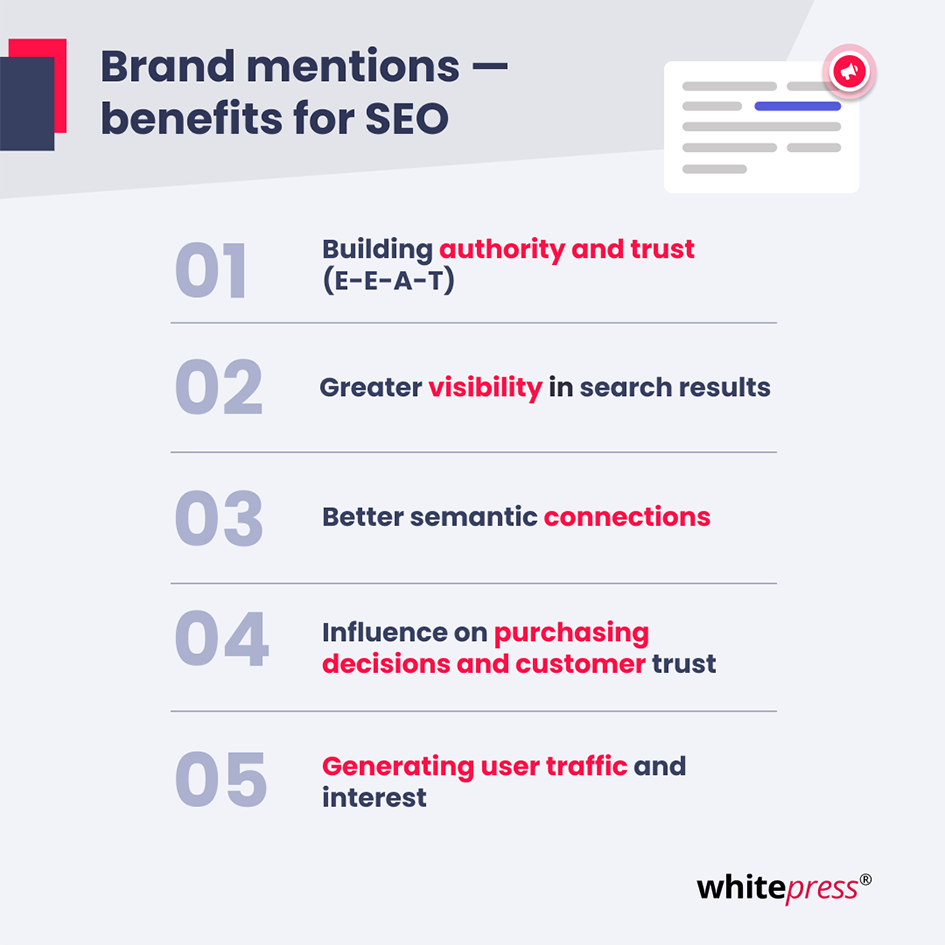
Brand Mentions from the Perspective of LLMs
Relying solely on traditional Google rankings is no longer enough. Today, you also need to think about how your brand is perceived by AI search tools and conversational assistants. The question is: how can you gain the trust of artificial intelligence? One effective way to strengthen your brand’s image in their “eyes” is through brand mentions.
Mentions and GEO
It’s no longer just about where your site appears in the SERPs – being cited and included in AI-generated summaries is just as crucial. Generative Engine Optimisation (GEO) focuses on making your brand attractive enough for generative models to reference it as a reliable source or example. LLMs don’t only register that your brand has been named; they also interpret the context – where the mention appeared, the tone of the mention (positive or negative), and the topic it was linked to.
In practice, this means you need to create content that is valuable and distinctive, so it naturally earns links and mentions from others – whether they are journalists, bloggers, or industry experts.
Authority and trust in AI responses
Large language models are trained on vast datasets collected from across the web. The more your brand appears in high-quality content, the more visible it becomes to AI systems. In other words, AI tends to favour brands that are widely discussed, treating them as more likely candidates to appear in user answers – because if many people talk about a brand, it must be worth highlighting. A company that is frequently and positively mentioned by authoritative sources will be seen by LLMs as more trustworthy.
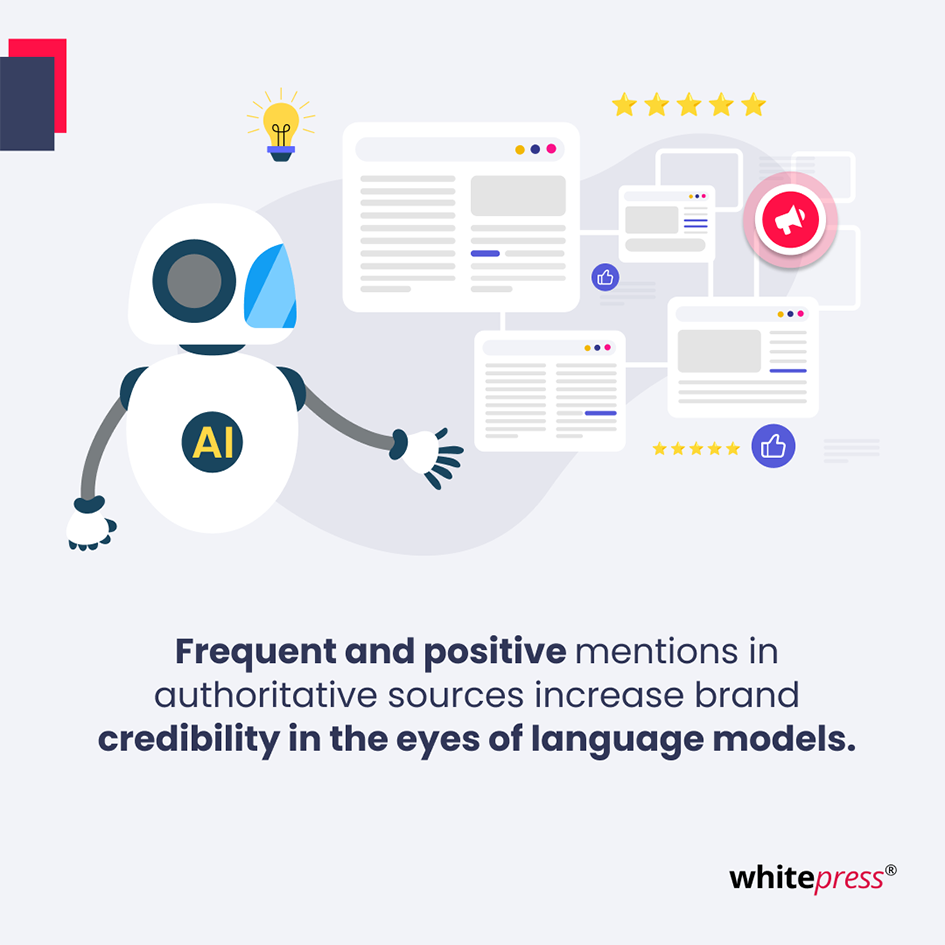
Search engines prioritise entities and brand knowledge
Modern algorithms increasingly focus on understanding what a brand is, what it offers, and how it is perceived, rather than relying solely on traditional signals. What matters is a consistent picture of the entity. The more complete that picture is, the more likely AI is to point to your website as a trusted source.
Mentions are one of the factors that help shape this brand entity. For example, if someone searches for “best smartphone for photos”, an intelligent search engine won’t just scan for keywords – it will connect well-known brands with that category. If your company is already recognised as a key entity in the field, the chances that an LLM will include your brand in its answer or summary are much higher.
Comment

Krzysztof Kowalczuk-Fijałkowski, Innovation Lead at Whites agency
Since large language models (LLMs) are probabilistic models, it is worth starting marketing activities by first understanding how they work. The starting point is the parsing of the prompt (the user’s query) by AI in terms of extracting entities, products, services, or solutions offered by websites.
This already imposes on us, as marketers, a certain way of working and an approach to brand mention building. Specialists responsible for positioning brands in AI-first search engines should therefore pay attention to the branding aspect of websites – something which, in traditional SEO, has not been the main focus. This includes, for example, pages such as “About Us”, “Our Mission”, or “Brand Philosophy”.
In this respect, one might say it is the first moment of feeding language models (LLM feeding) with data that are unique, represent the brand’s value, and form its competitive advantage – similar to securing the TOP1 position for one’s brand in classic Google search.
At the same time, it is necessary to build brand visibility beyond one’s own website. This is where brand mention building comes into play. Entities play an important role here, as they give the brand its unique context: the specifics of the offer, quality, price, scope of activity, or the values that distinguish it from competitors. Once again, we are “feeding” LLMs and enriching them with unique content – but this time through external platforms.
Brand mentions and PR efforts
Mentions aren’t only about SEO or AI visibility. They also play a big role in boosting brand recognition, extending reach, and building a stronger image in the eyes of potential customers – particularly when they come from popular blogs or respected media outlets. Since high-quality mentions are not easy to obtain, organised digital PR campaigns can be a valuable tool. Experts with experience and established networks can help you reach the most desirable publishers and secure those references.
The ultimate aim of PR activity is to position your brand as credible and authoritative. When independent media, opinion leaders, bloggers, or industry specialists mention your brand without being prompted or paid, it acts as a powerful signal of trust and value. Such organic recognition is far more persuasive than paid advertising, as audiences see it as genuine and unbiased. And, as you might expect, potential customers are far more inclined to choose a brand that’s widely recommended over one they’ve never heard of.
That said, volume alone isn’t everything. A surge of negative mentions or citations on low-quality sites can harm your reputation instead of enhancing it. If online conversations suddenly fill with complaints or criticism, it’s a red flag to take action – whether by improving your services or addressing misunderstandings with a transparent response. As algorithms become better at detecting tone and context, maintaining clear communication and solving problems quickly helps protect both your brand image and your search visibility.
Comment

Ela Iliesi, Strategic Growth Consultant, MAKE IT ACADEMY
AI-SEO today means consistent brand positioning, monitoring visibility in AI Overviews, and smart investments in digital PR and brand mentions. The winners are those who build brands that are impossible to ignore and focus on brand validation—exactly what algorithms and LLMs are looking for.
How to Earn and Leverage Brand Mentions
If brand mentions are becoming so valuable, the natural question is: how can you ensure that your brand is the one people talk about most often?
Here are a few proven approaches:
-
Create and publish high-value content
Invest in case studies, reports, practical guides, or useful tools. Give your audience reasons to talk about your brand and reference it in their own content.
-
Use digital PR
Strengthen your online presence and increase the chances of being cited in AI-generated summaries. Press releases, expert commentary, and guest articles in industry media are all effective ways to generate mentions.
-
Collaborate with influencers
Encourage them to share genuine recommendations in posts, videos, or podcasts. Social media remains one of the most powerful channels for sparking conversations about your brand – don’t miss out on it.
-
Engage where your customers talk
Join discussions on forums, community groups, review platforms, and Q&A sites. By offering valuable insights and responding to questions, you increase the likelihood of organic mentions.
-
Monitor and respond to mentions
Tools like Google Alerts, Brand24, Mention, or Semrush allow you to track new brand mentions and respond quickly when necessary. Whenever possible, ask authors to add a link to your website alongside the mention.
-
Maintain a consistent brand message
Share the same values, facts, and brand narrative across every channel. A cohesive communication style makes it easier for both algorithms and audiences to recognise and trust your brand as a credible entity.
How WhitePress® can support you
How can you take advantage of it?
- With our link insertion service, you can secure brand mentions in existing articles along with a direct backlink.
- You can also use our digital PR campaigns, which combine link acquisition from high-authority sites with organically obtained mentions.
Get ahead of the latest search, LLM, and media standards – start securing valuable brand mentions before your competitors do!
Are you a publisher on the WhitePress® platform? Add a new type of offer for marketers today: brand mentions! Learn more by clicking here.

Content Creator

